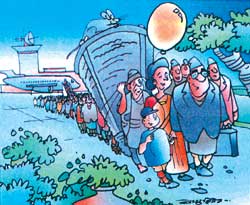 As prime ministerial trips go, Sher Bahadur Deuba's travel to New Delhi and Calcutta last week can be classed as a low-intensity visit. There was nothing he and his entourage did there that couldn't have been accomplished in one of those quick-turnarounds European prime ministers regularly make to a neighbouring country for business lunches with their counterparts.
As prime ministerial trips go, Sher Bahadur Deuba's travel to New Delhi and Calcutta last week can be classed as a low-intensity visit. There was nothing he and his entourage did there that couldn't have been accomplished in one of those quick-turnarounds European prime ministers regularly make to a neighbouring country for business lunches with their counterparts.
But our leaders have all the time in the world. Deuba went, he talked, he inspected the artefacts at the Victoria Memorial, and he returned. Since we didn't expect anything major to happen, we were not too disappointed that nothing did. It's true the Indian media ignored the visit, but why are we surprised? Although the trip loomed large here, in India's scheme of things the prospect of Lagaan winning an Oscar was much more in their overall national interest.
Cutting through the diplomatic verbiage, the rhetorical speeches, and the predictable answers to predictable questions at press conferences, we get a glimmer of the reason why the Indians perhaps ignored the visit. Deuba's most important achievement was to get Indian federal and state officialdom to finally acknowledge that:
a) Nepal has a serious Maoist problem;
b) its leaders have safe haven in Indian territory;
c) the growth of a Maoist revolt in Nepal has serious
crossborder implications for the Indian states in an arc of instability from West Bengal to Andhra Pradesh.
Lest this sudden spurt of Indian interest in our own dirty little war raise eyebrows back home, Deuba told just about everyone who cared to listen that there was absolutely no need for the Indian Army to spring to our aid. However, he did accept an offer for unspecified hardware, training as well as an imminent visit by Indian Home Minister Lal Krishna Advani. And he tried to placate the Indians about the presence here of western counter-terrorism advisers, and the purchase of non-Indian military gear. But with India now firmly in the US global war on terror saddle, this shouldn't have been as sensitive as it would have even a year ago.
 The visit also demystified certain mysteries. If it wasn't glaringly evident before, it is quite open now that the Indians have a fairly good idea of the whereabouts of our comrades in Noida and Gonda. Otherwise why would they escort Messrs Gajurel, Baidya and Rayamajhi to Siliguri to coincide with the Deuba visit? Deuba claims that his Indian interlocutors assured him they would help to curb the activities of the Maoists in India. If they meant that, could Siliguri perhaps be a place to start? Just asking.
The visit also demystified certain mysteries. If it wasn't glaringly evident before, it is quite open now that the Indians have a fairly good idea of the whereabouts of our comrades in Noida and Gonda. Otherwise why would they escort Messrs Gajurel, Baidya and Rayamajhi to Siliguri to coincide with the Deuba visit? Deuba claims that his Indian interlocutors assured him they would help to curb the activities of the Maoists in India. If they meant that, could Siliguri perhaps be a place to start? Just asking.
Meanwhile, back on the home front, Deuba returns to renewed efforts by party dissidents to unseat him. Which means he will now have to get back to devoting more time to curbing a possible mutiny rather than addressing the country's urgent governance crisis.
He is also now under pressure to take seriously Prachanda's offer of reopening talks.
Despite being personally doubtful of Maoist trustworthiness after being let down in November, there are now indications that the Maoists themselves are hot about talking again. The political leadership seems to have regained the upperhand within the movement, and the action of the security forces is taking a toll on the morale and mobility of the militia.
The last time the Maoists came to talk last year, they used the three months to launch a campaign of extortion and intimidation in the countryside, they rearmed, regrouped and retrained to prepare to take on the army. You can understand Deuba's wariness, and why he is insisting that the Maoists lay down their arms first. Deuba's hawkish advisers have also told him the Maoists will settle for nothing less than total power, and they are just buying time again by pushing out an olive branch.
If the talks resume, then it will be back to the minefield of constitutional reforms. However flawed, public opinion appears to be veering towards support of reforming the statutes as this is the only thing that will bring the Maoists to the mainstream. However, it is important to remember that what is happening today in Nepal is not really a failure of the constitution but a failure of politicians to work honestly and efficiently in the national interest. The constitutional debate may also be a red herring to divert debate from the real issues of governance, and lack of development. And ultimately it could narrow the discourse down to the powers of the monarchy.
The comrades, for their part, are using the fireworks in the run-up to and during their five-day bandh as a bargaining chip to force Deuba on talks. This will not work. What will work is Deuba being convinced that a resumption of talks will defuse threats from the Congress dissident factions and their unspoken alliance with the moderate left opposition.
One thing everyone-the Maoists, the ruling party, the opposition, the security forces-must respond to is growing public weariness with this senseless and wasteful war. There is a peace constituency out there, and political forces ignore it at their own peril.


